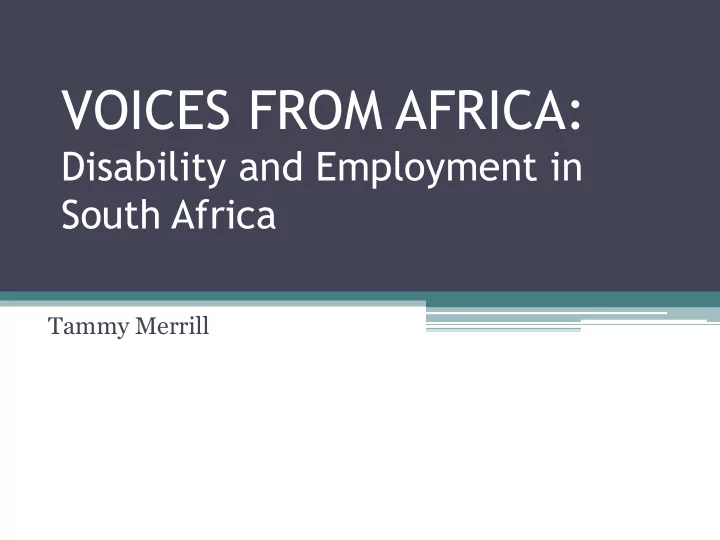

VOICES FROM AFRICA: Disability and Employment in South Africa Tammy Merrill
SOUTH AFRICA • Democratic republic in 1994 • Africa‟s largest economy • 11 official languages • 1.2M square miles • 49 million population: 79.0% African 8.9% Coloured 9.6% White 2.5% Indian 5-10% Disabled • 25% unemployment rate • 1.3M receive disability grant
Disability Rights Movement 1970’s - 1990’s 1990’s and Post Apartheid • Community advocacy • 1990 DPSA begins groups emerge late 1970‟s dialogue with African National Congress (ANC) • Influence of the Black Consciousness Movement • Disability Rights Charter Campaign in 1992 • Disabled People South Africa (DPSA)forms 1984 • Disability as a human- rights and developmental • DPSA engages govern- issue ment throughout the 1980‟s • Constitution and policy framework for inclusion
Policy Context South African Constitution (1996) • Protection against discrimination • Ensures access Skills Development Act (1997) • Require accessible education and training • Promote inclusion in the workforce Employment Equity Act (1997) • Barriers to employment be ID and eliminated • Reasonable accommodation • Firms must be diverse at all levels
Employment and Disability Despite progressive legislation… • Less than 1% of the workforce • The most under-represented group targeted by legislation • No gains shown in nearly a decade YEAR 2001 2003 2005 2007 2009 EMPLOYMENT 0.90% 1.00% 1.80% 0.50% 0.90% RATE
Disability, Race and Gender • White men and women over 2X higher for employed persons with disability • Women significantly under- represented • African women with disability are most disadvantaged
Research Design Theory Methodology • Disability Theory • Qualitative Research ▫ Social Model ▫ Longitudinal Case Study ▫ Demographics • Critical Theory • Data Collection ▫ Written Questionnaire ▫ Interviews ▫ Document Review
Learnerships • 70/30 Workplace- classroom ratio • Integrated curriculum • Content designed by industry • Partnership between learner, training provider and employer
Research Sample Main Players Data Sample • Learners • Learners ▫ 17 learners in total ▫ 7 learners interviewed • Training Provider • Training Provider ▫ Further Education & ▫ 4 Further Education & Training Institution Training staff • Employers • Employers ▫ 3 employers (large ▫ 1 employer financial institutions) representative
Research Findings Four Themes 1. Learnership Design and Implementation 2. Community and Society 3. Systems and Power Relations 4. Overall Efficacy
Learnership • Opportunity and • Support received was independence was important factor to 5 motivation learners • “Soft” skills were noted by 5 or 7 learners as the • Learning program design most valuable skills not significant factor learned • Disconnect between classroom and worksite curriculum
Community and Society • Perception • Community education needed ▫ View of disability ▫ Exposure of skills and abilities • Poverty and disability ▫ Challenge orthodox ▫ Multiple linkages perspectives • Accessibility • Institutional impact
Systems and Power Relations • Little policy oversight • Special Schools • Lack of focus on disability • Highly collaborative and equity complex between supply and demand sides of • Few financial resources labour allocated for the support of inclusive education • International connection and influence
Overall Efficacy • 4 of 7 learners were • Three learners are offered employment at currently employed in the end of the related field; a fourth learnership; two are learner has a consistent currently still employed employment record in a within the firm related field. • Of the four unemployed • Nearly all learners (6 of learners, two are actively 7) believed the looking for related work learnership prepared them for employment
Recommendations • Integrate support and • Community education facilitate networking programs • Coordinated link between • Include learners with industry and training disabilities in the design providers process • Universal Design • Acknowledge the power and influence of race, gender and disability • Integrate „soft‟ skills into curriculum • Dialogue with Special Schools
Implications South Africa United States • Workplace learning valued • Contextualized learning beneficial • Life skills imperative • Life skills imperative • Changing US demographics? • Cultural variable matter • How does race and gender • Poverty is the apex where impact SE practices? disability, race and gender intersect • Support critical to experience • Support and social networks play significant role in success • Lessons to learn, or not? • Inclusive policies
Recommend
More recommend